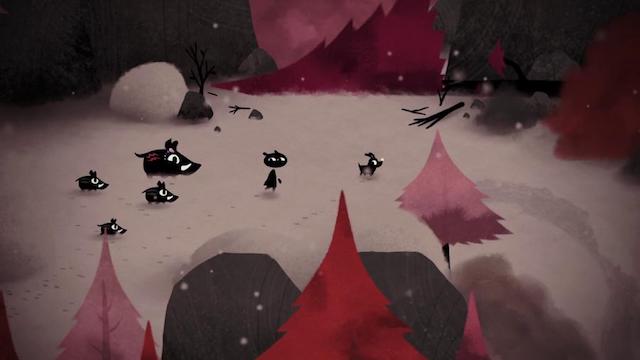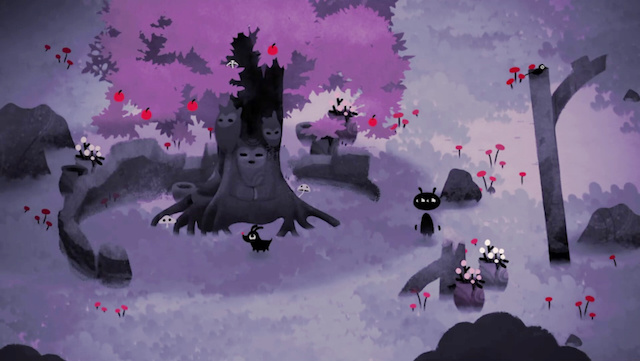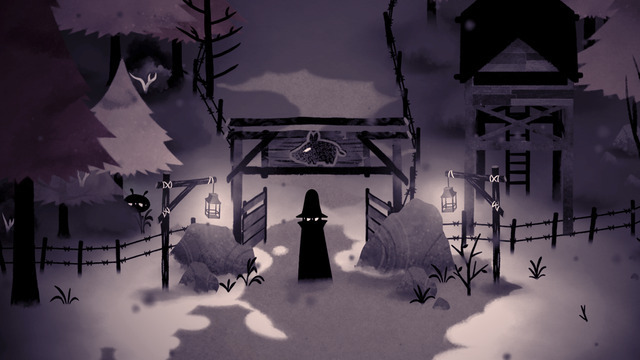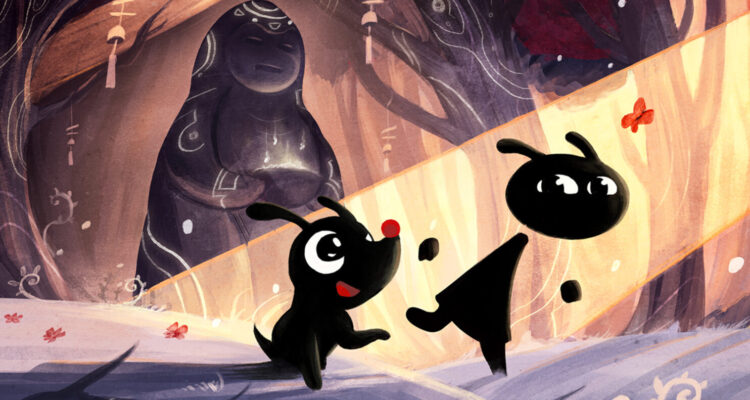Years ago, gamers and those who shunned the hobby used to argue about whether video games were art. That argument has understandably gone cold, and has mostly been forgotten over the last couple of decades, but it’s still something that us old-timers can recall. Why do I bring that up now? Well, there are releases that are more entertainment based and formulaic, like Call of Duty (which I’ve become obsessed with again), and then there are those which are more cerebral, more artistic and more crafted, for lack of a better term. These games may not be as entertaining as some of the others, but they exist for a reason that isn’t secondary to capitalism. One such example of this is Koira, which comes to us via the publication wing of industry veteran, Don’t Nod, which has become one of the most interesting companies in the business.
When Koira was first announced, I wrote about it but wasn’t sure of what to expect. There was talk about puzzles, which I’m not a big fan of in video games (although I go through up to two physical word search books a week now), and it seemed to be unclear as to exactly how it would play. I submitted a request for a review code, hoping that it would appeal to me when it dropped while wondering otherwise. Now that I’ve received said code, played through the game and have formulated my thoughts, I must say that my worry was unfounded. I do find that I have a lot of unnecessary worry these days, though, as I deal with health issues that make it harder to do what I enjoy, and work within an industry that has been overrun by overly difficult games like Soulsbornes, roguelikes and that kind of thing. What I mean by this is that I find myself worrying about whether a game will be a Soulsborne in disguise, or too difficult to complete once I reach a certain point. I’ve always been a good gamer, but I won’t profess to ever saying or thinking that I was the best ever. Being tired all the time has lessened my skill, as has age, and I don’t want to challenge the same enemy or boss umpteen times.
Developed by Brussels-based, Studio Tolima, Koira is a very memorable experience that comes to us thanks to Belgium’s Tax Relief Fund. Thanks to it, we’ve received a standout game that will be difficult to forget, for good reasons as opposed to bad ones. If you’re looking for something different, relatively unique and not overlong, it’s definitely worth looking into.

At the beginning of this approximately three hour-long story, players will awaken in the middle of a grayscale forest. Without knowledge of who they are or what they’re supposed to be doing, they’ll follow plants that begin to light a path through the dark and gloomy woods. Not long after this, one will come across a little black puppy, who’s been trapped and is hanging from a rope. Thankfully, this little digital furball is unharmed and no worse for wear, and quickly becomes your friend and ally after you undo the rope holding him hostage and then prove that you’re not one of the scary hunters who imprisoned him.
For the next little while, the unnamed protagonist and his new best friend must navigate the mysterious forest by following clear paths, solving puzzles and then opening new ones up by doing away with pesky and harmful black clouds. Thankfully, said puzzles are very light, and usually involve finding a few different musical notes to appease a goddess statue. This is generally done by interacting with different birds, placing the right stones on altars, throwing nuts at squirrels and finding the missing pieces of a statue. It’s never overly difficult, nor is it overly intensive, which I appreciate. I don’t like obtuse video game puzzles.

A lot of the time, what you’re trying to do is gain access to red apples that (sparingly) grow on trees throughout the forest. When fed to the little puppy, these fruits give him an unexpected power: that is, the ability to light your way through those aforementioned black cloud patches. Getting to these apples can be as easy as tossing a stick or a snowball at a tree, but it becomes more difficult as the game progresses, although difficult is a relative term in what isn’t a very challenging game.
Although it’s full of heart, charm and whimsy, Koira is not a colourful or pleasant romp through a forest that’s full of life. In fact, it’s a bit more nightmarish than that, although said horror doesn’t come by way of monsters. That is, unless you want to call the human-esque hunters monsters, which I guess they kind of are. These bastards are represented by shadows, and are flanked by mean dogs that will alert their masters to your presence if you’re spotted or not careful. The hunters are not present at the beginning of the game, but become increasingly more prevalent as one approaches its credits, and they can be challenging to avoid, run away from or escape. That’s one of the problems with Koira as, while its stealth mechanics and other related designs aren’t at the forefront of the experience, they play a big enough role and aren’t the best ever designed. It can be unclear as to how to get through certain sections where you must move from bush to bush, and avoid noisy twigs, in order to get past packs of dogs and hunters, which move around and patrol the areas. At times, it became trial and error, and I’d just keep trying similar things until I got through. The enemies’ patrol patterns were odd, and they were really good at detecting me regardless of how careful I was.

There were a couple of moments within this campaign where I got a bit frustrated, but that’s it. The one that comes to mind first involved running from a group of hunters and attack dogs, and took place near the end of the game. My goal was to run sideways, from the left side of the screen to the right, avoiding bear traps and whatnot while doing so. I made it to the end multiple times, and should’ve just fallen off of the cliff towards safety as I did the last time I attempted it. However, there were at least three occasions where I made it to the cliff and then my character turned and walked in the opposite direction, back towards imminent capture. Needless to say, it was annoying. It wasn’t until I ran to the southernmost point of the cliff that the next cutscene triggered, during which these poor protagonists tumbled off of the cliff and into the snow and bushes below.
Most of the segments dealing with the hunters involve solving light puzzles in order to escape their camp(s), free scared boars of varying sizes, or just doing what’s required to avoid their patrols. However, there is some light ‘combat,’ which is strange but factors into a story that is about the best and worst of us all. I won’t spoil it, but know that it’s very limited and unique. I will, however, say that I liked how the puppy would occasionally become scared of what the human (I think that’s what we’re supposed to be, although the main character kind of looks like a cat in some ways) has to do, and what they occasionally become. There were times where the scared animal would cower and hide, and I’d have to coax it back out and regain its trust. That felt organic, seemed realistic and was a nice touch overall.
As mentioned above, though, Koira is not all doom and gloom. This game strikes a nice balance between being beautiful and whimsical, while also being nightmarish. I respect what the developers did to achieve this, and found myself truly empathizing with these two unnamed characters who unexpectedly found themselves in a strange, surreal and downright dangerous situation. They make the best of it when they can, by looking for images in the clouds, playing hide and seek (with both taking turns acting as the hider and the seeker, which was cute), building snowmen and playing both fetch and ‘volleyball.’ It’s also possible to take a break, by resting amidst fluttering butterflies, sitting beside a campfire or stopping at a bench, and these things often come with trophies if you wait long enough (and care about such things). As a whole, these optional diversions, or ‘minigames’ (using the term loosely), help form the player’s bond with the game’s two main characters, and add a lot of heart to the experience. They also remind us that beauty can be found in some of the worst situations, like two strangers helping each other as they do in this story.

Now, you may be wondering what the personalities of the unnamed main character and his newfound puppy friend are like. Well, you should know that none of it is expressed through dialogue, because Koira is free of words, and doesn’t tell you what to do next. Yes, you read that right.
Instead of being told through written and/or spoken words, this game presents its story through animations, colours, music and thought bubbles that appear over the puppy’s head. I previously mentioned how the game world is dark and grayscale, but that’s only the case at the beginning and during parts of the final third. The rest features varying shades of red, including dark red and pinkish hues, as well as a touch of blue, and these colours appear in the trees, skies, and water. This form of artistic design helps break up the grayscale, makes the world feel more alive, and creates a really interesting juxtaposition and palette change. Still, Koira is a very limited game in terms of colour, animations and visual design, but that was by choice. It all works, too!

Let’s move on and talk about the music, which I feel I’ve done a disservice by not talking about it until now. Simply put, Koira is heavily sound-based. I’m not suggesting that it’s a rhythm or melody-based game, nor am I saying that it’s some sort of musical. Not at all. Like I said at the start of this review, Studio Tolima’s debut effort is art, and this piece of art mixes different mediums, like visuals, music and interactivity. Yes, I realize that what I just said is true of pretty much every video game ever made, and no, I’m not suggesting that this is the best game ever created or anything like that. What I’m trying to say is that this is one of those titles where music doesn’t play second fiddle. There’s no dialogue, but every flower you walk through emits a sound, every active statue (read: ones that aren’t in ruin) you discover requires you to find three or four different golden musical notes, and there’s a constant tone as you play through this three hour experience. It’s neat, it’s well crafted, and it’s purposeful. Playing with a headset is suggested as a result.
All of the above combines to create a game I’m glad I requested, and happy that I played through. Although Koira has its faults, and does have some pacing issues, it’s a unique, memorable, thoughtful and well crafted experience that will stick with me, and anyone else willing to give it a chance. It ran perfectly, and is very well priced, too, given that it’s less than $20 in other countries and only $23.99 in Canada. That’s on PSN, though. It seems like Steam is currently offering ten percent off as a launch deal.
Don’t sleep on this one!
This review is based on the PlayStation 5 Pro version of the game, which we were provided with.

